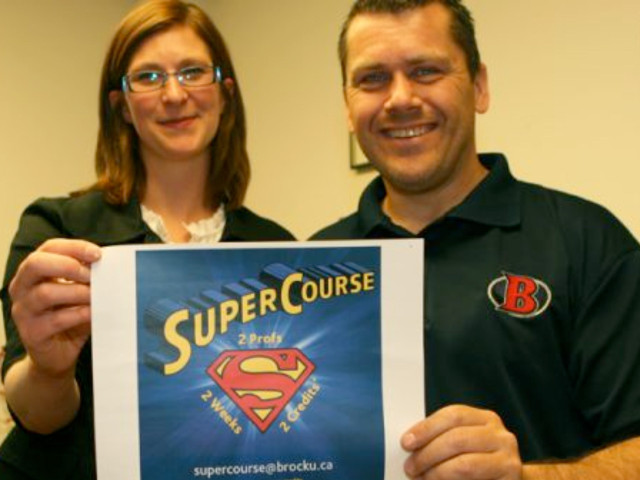Bright Ideas
Compressed “SuperCourses”
Institution: Brock University, Ontario
Implementation Date: October 2010

Brock University has found successful a compressed delivery model for several courses, like “Introduction to Community Health Sciences,” that accelerates a standard 8-month course down to just 2 weeks in the spring. (Professors Madelyn Law and Brent Faught appear in the photo above)
The pace is intense, of course: students are in class Monday through Friday from 9am until 6pm. The course is team-taught by two professors, augmented by guest lectures, videos, and online activities. Students write a quiz every day and a 3-hour exam each Saturday. But by the end of the two weeks, the students have covered all the same material as the 8-month course, and they average grades 8% higher (perhaps because the course has their undivided attention, or perhaps because they have 7 fewer months in which to forget what they have learned).
After Brock beefed up its spring academic menu, expanded external registration access and aggressively promoted it in student newspapers province-wide, spring enrolment in 2013 jumped 35% over the previous year.
This delivery model has some of the same advantages and disadvantages of the block method employed at Quest University, and being tried experimentally by UNBC. What have been your experiences as teachers or students in these sorts of compressed courses?
Key Contact
All contents copyright © 2014 Eduvation Inc. All rights reserved.
4 Comments
Or perhaps the marks are 8% higher because the material is diluted and the assessments are easier. Also – have they looked at long term retention of concepts taught in these ‘Super’ Courses?
In response to skeptical joe, the content was not diluted. Both content and instructors were the same and the face-to-face in class time was the same amount. Exams and tests were also the same. Dr. Law and myself are currently conducting an investigation regarding knowledge retention in a first and fourth year health sciences courses; comparing traditional versus Supercourse formats. Students will be re-tested for course content at 3, 6 and 12 months following completion of the course. This longitudinal study is funded by Brock University’s Centre for Pedagogical Innovation and HEQCO.
http://www.opencolleges.edu.au/informed/news/why-spaced-learning-works-better-than-cramming/
Thanks Joe. I’m not sure that compressed courses are the same thing as cramming, or that mice learning the horizontal optokinetic response are a fair comparison to students in an accelerated course. Sleep deprivation and cramming are certainly not good for learning.
Some studies make it clear that sleep helps us consolidate our learning, and naps are useful breaks to prevent burnout. http://gawker.com/5741490/want-to-memorize-something-take-a-nap
I think the stress and cramming created by the current semester system is considerably worse for student learning than taking a single course in a concentrated way.